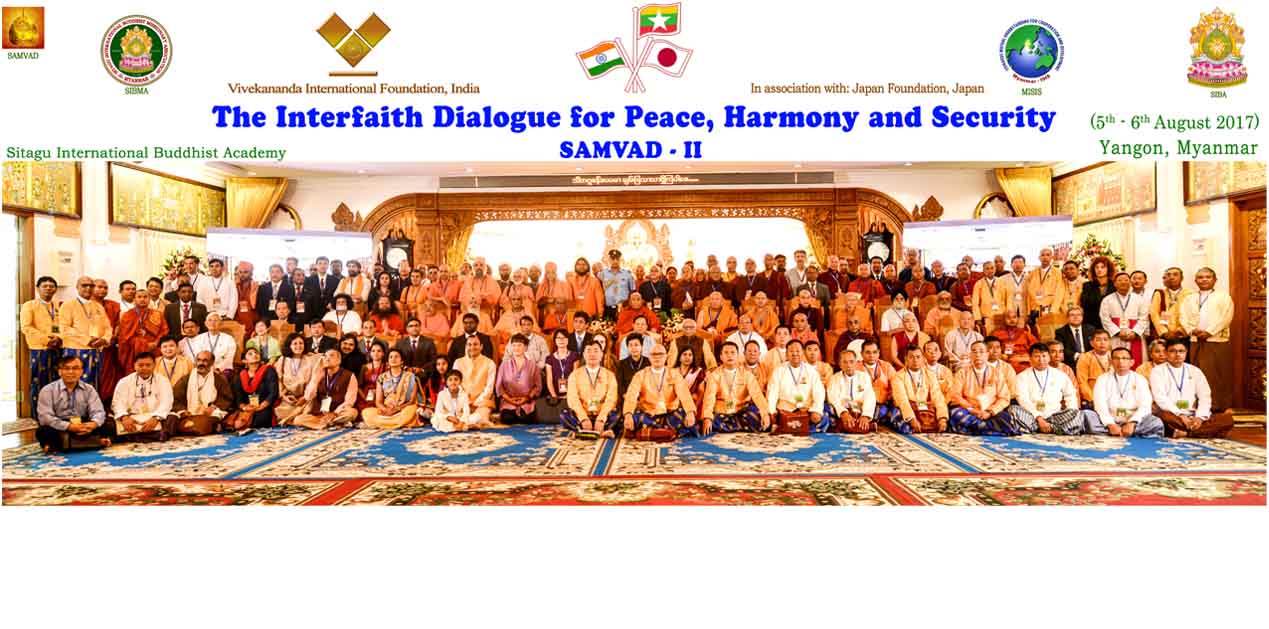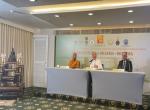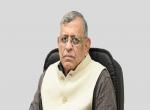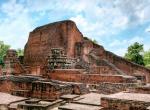It will be recalled that ‘SAMVAD’ is an initiative of Vivekananda International Foundation (VIF) that was borne out of dialogue between the Indian Prime Minister Narendra Modi and Japanese Prime Minister Shinzo Abe. The purpose was to adopt principles of Asia’s age-old spiritual teachings of Hinduism and Buddhism to address modern-day issues threatening human civilisation. This it is imperative that inclusive and non-conflicting philosophies, exclusivist ideologies, spiritual masters and experts engage in a frank, honest and all-encompassing dialogue on finding an alternative narrative and vision based on the spirit of understanding, acceptability, ethical behaviour, universal responsibility to shift the paradigm of global discourse on the two critical issues facing humankind: Conflict and Environmental Degradation.
Thanks to collective efforts and invaluable contribution of our partners Sitagu International Buddhist Academy (SIBA), Yangon and Myanmar Institute of International and Strategic Studies (MISIS) and presence of distinguished spiritual leaders from different faiths, keynote speakers, eminent scholars and panellists, and enthusiastic participants from about 30 countries, the SAMVAD-II, held in Yangon, Myanmar, on August 5-6, 2017 was a resounding success.
The highlight of the conference was a Round Table Summit of Spiritual Masters that was participated by most eminent spiritual leaders of Buddhism, Hinduism, Islam, Christianity, Sikhism and Jainism. The schedule included the inaugural session, Round Table Summit of Spiritual Masters, a Plenary Session and Academic Sessions on ‘Evolving A Non-Conflicting Philosophical Paradigm for Conflict Avoidance, Peace & Harmony’ on Day One, ‘Environment Consciousness for A Sustainable World’ on Day Two and a Valedictory Session. Extensive deliberations over these two days established that Buddhists and Hindus must lead the initiative through a philosophical approach to the commonalities in their spiritual teachings to create a more tolerant, liberal and accommodative world which is based on mutual respect and acceptability of diversity of views so as to live in harmony with nature rather than seeing it as a resource to exploit.
In all, over 100 speakers addressed the gathering and presented their papers. The diversity of perspectives and views shared during presentations and deliberations indicated the openness and deep desire for a dialogue beyond the cliché and tokenism that most inter-faith and peace initiatives have been reduced to. Despite different perspectives, all converged on finding a common ground for sustainable peace in a secured Mother Earth.
Venerable Dr Ashin Nyanissara, spiritual head and Chancellor of the Sitagu International Buddhist University (SIBU), in his opening address, set the tone for the conference by noting, “The desire for peace exists everywhere, but most people are not able to enjoy peace, stability and security they desire”. Video speeches of Prime Minister Narendra Modi and Prime Minster Shizo Abe, speeches by HE the Governor of Uttar Pradesh, India, Shri Ram Naik, the Hon. Minister for Religious Affairs, Government of Myanmar, Mr. Thura U Aung Ko, and the Inaugural Speech of HE the State Councilor Daw Aung San Suu Kyi read by National Security Advisor of Myanmar Mr U Theung Tun, set the ball rolling. The speeches underlined the emerging dangers to world peace and environmental catastrophe looming over our Mother Earth, the only home for the mankind.
Prime Minister Shri Narendra Modi, in his video speech, referred to the critical questions about global challenges the world is facing today, like conflicts and climate change. He stressed that “it is only through deep and prolonged dialogue - Samvad- that we may discover hidden synergies, resolving contradictions and only way to cut though deep rooted religious stereotypes, prejudices that divide communities across the world and sow seeds of conflicts”. He referred to Hindu-Buddhist philosophical approach of living in harmony with the nature, the need to revere nature and not just see it as a resource to exploit.
The Japanese Prime Minister Shinzo Abe, in his video message, referred to the Buddhist quote, “may all beings be well and happy”, to emphasise that spirit of tolerance and compassion encompasses coexistence of all lives. He warned that the spirit of tolerance was facing challenges today and terrorism and violent extremism were expanding in trying to deny the existence of ‘others’ and painting our world in a single colour. He stressed that in Asia, “we must let flowers of all different colours bloom in harmony.”
In her written speech, the State Counsellor and Union Minister for Foreign Affairs, Daw Aung San Suu Kyi suggested that in tackling conflict avoidance, religious leaders of the world must impart the virtues of tolerance and non-violence as embedded in every world religion. She emphasised on making an attempt to establish community peace, regional peace and global peace. Her speech concluded with the call for:
• May the balanced mind make unbalanced world balanced!
• May all conflicts and animosity be ceased!
• May peace and harmony prevail everywhere!
The Governor of Uttar Pradesh, HE Shri Ram Naik, in his inaugural speech, pointed to the great contribution of Hindu and Buddhist traditions to the modern world, such as yoga and mindful meditation. Noting that it was a Burmese of Indian descent, SN Goenka, who introduced Vipassana (mindful) meditation to the world.
Among other notable speakers at the inaugural, academic and valedictory sessions were the Chief Minister of Yangon Region, U Phyo Min Thein, State Minister for Foreign Affairs of Japan, Nobuo Kishi, Hon Deputy Minister of Buddhasasana and Justice of Sri Lanka, HRSD Mitrapala, Minister for Social Affairs of the Government of Yangon Region, U Naing Ngan Linn, Deputy Chairman of the Parliamentary Ethical Sub-Committee and MP from Mongolia, Danzan Lundeejantsan and Ms. Hiroko Tsuka, Executive Vice President of The Japan Foundation.
At the Plenary Session Shri S. Gurumurthy from India and Professor Dr. Khin Maung Nyunt from Myanmar set the agenda for the two days of deliberations to evolve a new paradigm of philosophical approach to the two issues of Conflict and Environment that humankind is grappling with and the need for taking the initiative to the grass roots. They stressed on the need to break the shackles of ideologies and strive for philosophical debate as means to develop universal understanding. Shri S. Gurumurthy stressed on the need for introspection and review of scriptures and texts that steer religious ideologies towards intolerance and conflict. He cited reformist movements and debate within Hinduism that led to discarding texts and commentaries that sanctioned ills such as untouchability and Sati. Both stressed on the need for people-participatory approach by going back to fundamentals of our spiritual discourse of environment consciousness to shift from exploitation to respect and harmony with nature as co-habitants of Mother Earth.
Speakers at both the Round Table and the Academic Session, ‘Evolving A Non-Conflicting Philosophical Paradigm for Conflict Avoidance, Peace & Harmony’ on Day One stressed on the principle of freedom of practicing own religion without any interference from others. They stressed that it is only when certain radicalized elements try to force their own ideologies on others that it becomes a major reason for strife. Importance of dialogue and the capacity to listen to the alternate viewpoints was emphasised. Speakers agreed that Samvad offers an opportunity to analyse the threats and challenges to world peace and suggests sustainable approaches such as the need for adopting non-conflicting ideologies. Eminent speakers such as Hon Minister for Religious Affairs, Myanmar Mr Thura U Aung Ko and Mr Surin Pitsuwan, former Foreign Minister of Thailand and former DG, ASEAN, in their speeches stressed on the harmonious relations between religions for lasting peace and security.
The highlight of the Samvad II was the Round Table Summit of the Spiritual Masters on both Days 1 and 2. It was participated by most eminent Spiritual Masters of Buddhism, Hinduism, Islam, Christianity and Jainism. The agenda for the summit included:
a) Creating a conducive and compelling eco-system with the objective of emphasizing the importance of dialogue and understanding for avoiding conflicts,
b) Instituting sustainable institutional model for frank and open dialogues between non-conflicting philosophies, ideologies and evolving a long-term perspective to promote institutions to carry forward ideas generated though these dialogues for lasting peace, harmony and security.
c) Bringing environment consciousness in global discourse and promote significant changes in the way our present economic system is inherently structured on unsustainable conflict with the nature.
d) Establishing a global network of leaders in a wide range of social, political, environmental and intellectual arena, committed to the promotion of democratic values, conflict avoidance, environmental consciousness, universal responsibility and ethical behaviours
Referring to texts in “Abrahamic” scriptures that permeates exclusivist ideologies and lack of tolerance of other beliefs, several speakers cited how Hindus have rejected old Hindu scriptures and texts that does not fit into the 21st century. It was suggested that Muslims and Christians too may consider rejecting terms such as Kafir, Kufr and Heathen from their scriptures that may preach exclusivity and provide grounds for extremist ideologies. Several Buddhist masters, especially from Myanmar and Cambodia, referred to conversions as another cause of conflict, to which Hindu masters also empathised with. Both stressed on respect for all religions and the spirit of co-existence. Muslim and Christian spiritual masters and scholars appreciated the concerns and even agreed on the issues raised to put forth their perspectives and the need for continued dialogue where issues of mutual concerns are frankly discussed. Muslim participants also spoke about a very critical phase that the Islamic world was passing through, with Muslims pitted against the rest of the world, horrendous killings by extremist ideologies in the name of Islam and sectarian conflicts. It was pointed out that there will always be people trying to hijack religion to suit their vested interests and hidden agendas. These elements would twist and turn the truths and translate them in line with their sinister plans, and that they should not be looked upon as role models for any religion. It was stressed that truth is not just in books but it has to be experienced to be realised. Al-Haj Aye Lwin, Chief Convener of the Islamic Centre of Myanmar, while endorsing the spirit of Buddhist ‘Kalama Sutra’ (Buddha’s sermon on free inquiry) and the Hindu sayings of Swami Ramakrishna, argued that any dialogue would certainly be counter-productive if anyone alleged that other religions are false or label the adherents of other religions as heathens or kafirs.
The Academic session on Day 2 was on the theme of Environmental Consciousness. The speakers concurred on environmental consciousness being the prime paradigm of socio-cultural cooperation and collective global action. The philosophical underpinning of dharma was also touched upon by speakers. It was pointed out that the Earth is our only home in this universe, which we have taken for granted. Environmental protection would be possible only with self-awareness based on our ancient religious beliefs with respect to Mother Earth. It was noted that Hindu and Buddhist philosophies aver that man, being part of nature and not independent and certainly not its master, is fundamental to protecting and sustaining environment and ecology. Hon. Minister of State for Home Affairs, Shri Kiren Rijiju, in his special address in the session on Environment Consciousness for A Sustainable World (Day 2), called for an urgent need to create a mass movement to create awareness on what crisis our planet and humans are facing and bring Environment Consciousness into the global political, religious, social and public discourse.
The highlight presentation in the Academic Session on the topic was by His Holiness Drikung Kyahgon Chetsang, from India and the supreme head of 800 years old Drikung order of Tibetan Buddhism. Referring to Buddhist concept of interdependent origination that applies to everything in the world, he called for an authentic environmental consciousness to develop naturally once people recognise the deep interdependence between humans, plants, and animals. He stated that ancient Buddhist philosophy of interdependence is critical to the future of our planet. He also cited the “Go Green Go Organic” campaign his monastic order is developing in the Himalayan Ladakh region of India where water supplies and environment are under threat from global warming. He underlined that natural disasters and ecological problems do not choose people of one religion or one nation. Speakers also quoted extensively from Hindu philosophical perspective of revering the nature and Mother Earth. Indian cultural traditions of ‘Vriksha Vandana’ (reverence of trees), ‘Ganga Vandana’ (worship of water) and ‘Bhumi Vandana’ (homage to earth) were also cited to inculcate environmental consciousness. Habitat loss, poaching and wanton killings by the meat industry for human consumption, which promote wastefulness and lack of compassionate in the society, was also spoken about.
The deliberations at the Round Table Summit of Spiritual Masters on Day 2 was focussed on evolving a consensus on Action Plan and to create institutional means to take the Samvad initiative to the grassroots for dialogue among non-conflicting philosophical traditions as well as with conflict prone ideologies. Based on these, the Yangon Declaration was unanimously adopted. Copy of the Declaration is attached.
Hon. Chief Minister of Uttar Pradesh, Yogi Adityanath, was the Chief Guest at the Valedictory Session. In his address, he pointed out that Indian philosophies are not dogmatic and do not thrust their points of view on others. He made many references to Buddhist scriptures in his speech and stated that “We have inherited this glorious tradition of tolerance and peaceful accommodation of ideas, differing from our own – something which has almost vanished in the contemporary world”. Drawing parallels between Hinduism and Buddhism in their approach to sustainable development, he added, “If the world must progress towards peace and prosperity, it is time to re-evaluate Lord Buddha and his Dhamma”. His presence was highly praised and his ideas resonated through the participants, especially among the Buddhist spiritual masters and other monks attending the session.
After the conclusion of the Conference, delegates were taken on a visit to the majestic Shwedagon Pagoda, the religious symbol of Myanmar. The next day, i.e on Aug 7, the delegates were taken on a day trip to the UNESCO world heritage site of Bagan by a chartered flight courtesy Sayadaw Dr. Ashin Nyanisara.
Conclusion
For the VIF and its partners and hosts, the Sitagu International Buddhist Academy, Myanmar Institute of Strategic and International Studies, and The Japan Foundation, these two days have been immensely fulfilling. The Samvad is aimed to initiate intermingling and exchanges among religions, scholars and institutions towards building a new eco-system and to take the initiative to the grassroots. The rich and scholarly discourse, research and frank opinions expressed by all the speakers, especially the spiritual masters, and unanimously agreed declaration gives the hope and guidance to steer us in this mission. The conference not only met the objectives that were set out to achieve but went much beyond that. The proceedings and discussions in both the Round Table Summit and the Academic Sessions indicated an overwhelming consensus on finding an alternate narrative to issues and crises confronting the human civilization. All agreed on the urgent need to open ‘people-participatory paradigm’ over Conflict Avoidance and Environmental Consciousness at ‘macro and micro levels’, besides actions by governments, multilateral and global bodies. This conference has given the lead to pursue that path. It also became evidently that:-
• The SAMVAD process needs to grow on a more formalised basis.
• The two religions may be able to lead the world in promoting sustainable models of conflict avoidance based on respect for all religions, philosophies, coexistence, understanding and environment consciousness for humans and nature to live in interdependent harmony.
The Japan leg of the Conference would be held in Tokyo in January 2018, while the VIF is considering to host Samvad III either in Sri Lanka, Nepal or New Delhi in 2018-2019. It is hoped that post SAMVAD – II, this process of exchange and easy intermingling will gather momentum.
The Yangon Declaration
We unanimously agree and declare on this 6th Day of the Month of August, 2017 that:
1. All the people of the world have to cooperate and endeavour together, without any fear, in order to obtain harmonious social life with full security assurances.
2. We denounce all kinds of hate speech, false propaganda, conflict and war under the pretext of religion and strongly condemn those who provide support any such activities.
3. We, leaders of all religions of the world, resolve to be builders of the harmonious human society by religious teachings and involve ourselves in consolidating peace and security of the world.
4. We, members of different faiths, need to build mutual understanding, respect and trust among ourselves in order to obtain a peaceful, secure and prosperous human society.
5. We resolve to exercise restraint and refrain from interfering in matters of other religions and to cooperate in building bridges for world peace.
6. It is our inherent duty to conserve the environment before it is too late for the survival of humankind.
7. All religious leaders from India present at this Samvad II have unanimously decided to meet once in every four months (and as and when it is required), starting from 4 December 2017to build bridges and harmony.
8. We shall collectively initiate programmes to enhance environmental consciousness and undertake awareness/ protection projects.
9. To strengthen understanding and trust, we shall organize an interfaith camp for meditation.
10. All the spiritual paths and religious traditions are equally valid.









Post new comment